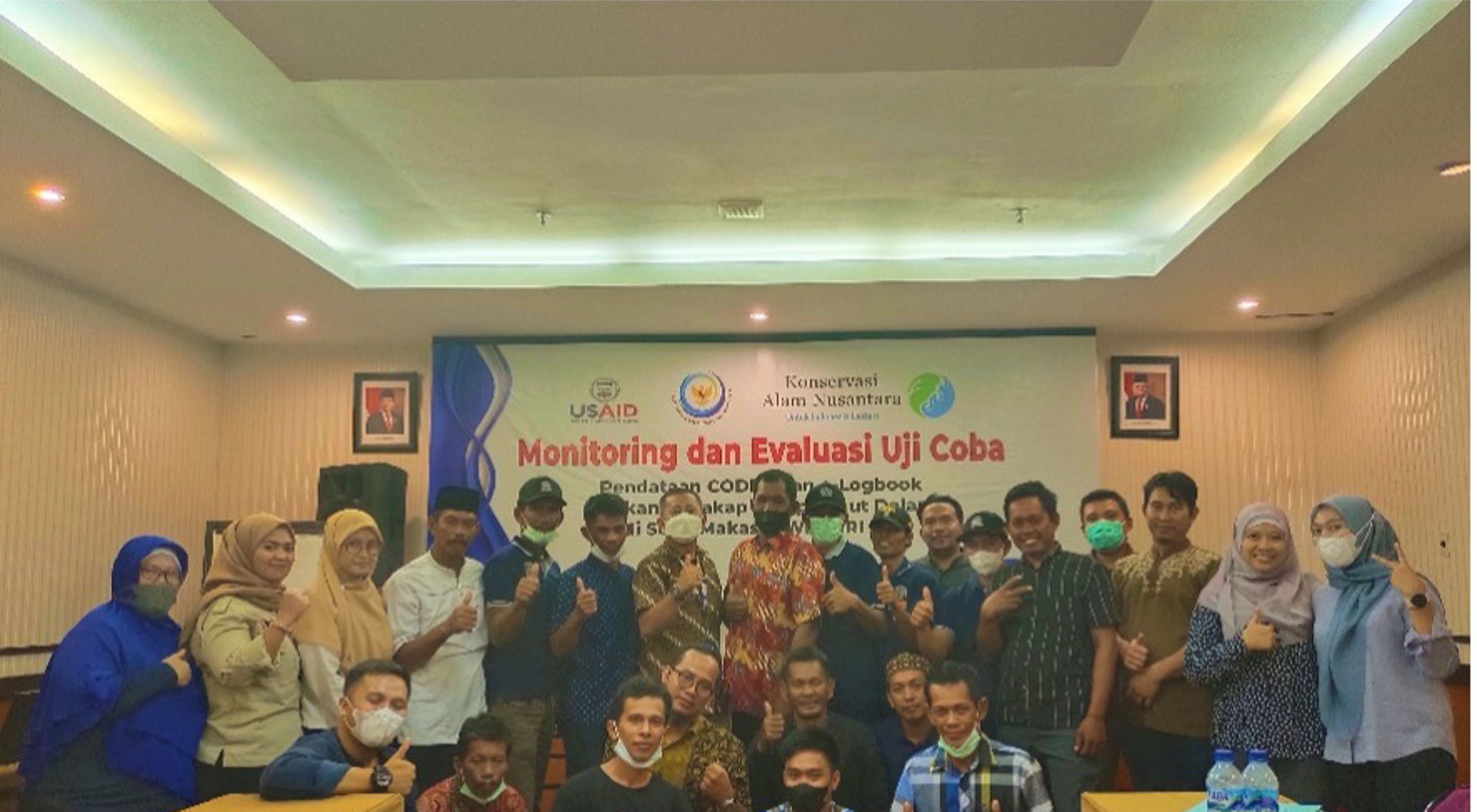Bontang Fishermen Apply Fish Data Monitoring Technology to Manage a Sustainable Grouper Fishery
Media Contacts
-
Maria Adityasari
Communication Specialist YKAN
Yayasan Konservasi Alam Nusantara (YKAN)
Email: maria.adityasari@ykan.or.id
One of the biggest challenges in practical fisheries management is the lack of catch information and data. Therefore, strengthening fish data collection practices is essential in supporting sustainable fisheries management, especially involving fishermen and fisheries actors. It was the main discussion in the "Monitoring and Evaluation of CODRS Data Collection Trial and e-Logbook of Grouper Fisheries with Bontang Fishermen" on Monday, June 6, 2022, in Bontang, East Kalimantan.

Fishery data is needed to accurately inform the status and stock to make fisheries management decisions. With the enactment of the Snapper and Grouper Fishery Management Plan at the end of 2021 and the preparation of a harvest strategy as its derivative for several Fisheries Management Areas of the Republic of Indonesia (WPPNRI), monitoring of fishery data is necessary. Moreover, Indonesia is the world's largest supplier of snapper and grouper, with an annual production of 119 thousand tons.
To support the Ministry of Fisheries and Marine Affairs of the Republic of Indonesia (KKP), since 2016, under the umbrella of USAID Supporting Nature and People–Partnership for Enduring Resources (USAID SNAPPER) activities, Yayasan Konservasi Alam Nusantara (YKAN) develops innovations in effective and efficient fish data monitoring, through the Fisheries Data Collection System (CODRS).
In collaboration with the Directorate of Fish Resource Management (PSDI) and the Directorate of Capture Fisheries (DJPT) of the Ministry of Marine Affairs and Fisheries, YKAN continues its commitment to collect data on snapper-grouper fisheries using the CODRS method continuously to the program's target areas, one of which is Bontang located in WPP 713.

"Bontang was chosen to be one of the locations for monitoring fishery data using the CODRS method because this area is full of snapper and grouper fishing activities, especially for small-scale fisheries," said Aris Budiarto, M.Si, Sub-Coordinator for Utilization of Inland Marine Fish Resources, Territorial and Archipelagic Waters, Directorate of PSDI, DJPT KKP. He also emphasized, "Monitoring fishery data in Bontang is critical because it is one form of implementing the harvest strategy for Snapper and Grouper Fisheries in WPPNRI 713, which includes the Makassar Strait, Bone Bay, Bali Sea, and the Flores Sea."
Fisherman involvement and data collection innovation
The CODRS method involves fishermen who have been trained to take photos of all the fish caught. The fish are arranged vertically on a measuring board while the SPOT Tracer vessel monitoring system records the fishing position. The captain or crew of the ship is equipped with digital cameras, fish measuring boards, and ship monitoring devices. Training for fishermen and boat crews implement to ensure that all fish caught have been photographed on a measuring board, and the fishing position with the SPOT Trace remains active during fishing.
"The direct involvement of fishermen in recording fishery data is necessary to ensure data availability in a certain area coverage in a short time. Suppose special personnel placement implement for collecting fishery data covering all Indonesian waters. In that case, the costs will be substantial," said Sustainable Fisheries Senior Manager, Yayasan Konservasi Alam Nusantara, Glaudy Perdanahardja.
He further added, "The involvement of fishermen (and fishery actors) in fisheries data collection will ensure direct support from active actors in the fisheries sector for findings (fishery data results) that will form the basis for fisheries management decisions."
In addition to using CODRS, monitoring of fishery data in Bontang has been implemented using the e-logbook method developed by the PSDI Directorate, DJPT KKP, over the last few years. "CODRS is a verification method for e-logbook data collection for small-scale fisheries. The two fisheries data collection systems can support each other in strengthening small-scale fisheries data collection in Indonesia," said Ade Setia Januar, Sub-Coordinator for Monitoring Fish Resource Management, PSDI Directorate, DJPT KKP.

Designing a management approach for snapper and grouper fisheries, particularly in Indonesia, requires an in-depth understanding of these fisheries, the current management framework, and the technology available to support management. Monitoring data on the status and efficient stock of fisheries is the primary reference for regulating fishing practices through harvest control rules that can be enforced and agreed upon by fishing companies, ship owners, and skippers. All of these efforts start with effective and efficient fisheries data collection.
Yayasan Konservasi Alam Nusantara (YKAN) is a scientific-based non-profit organization that has been present in Indonesia since 2014. With the mission of protecting lands and waters as life support systems, we provide innovative solutions to realize the harmony of nature and humans through effective natural resource management, prioritizing a non-confrontational approach, and building a network of partnerships with all stakeholders for a sustainable Indonesia. For more information, visit ykan.or.id.


